#ligurian places
Explore tagged Tumblr posts
Text
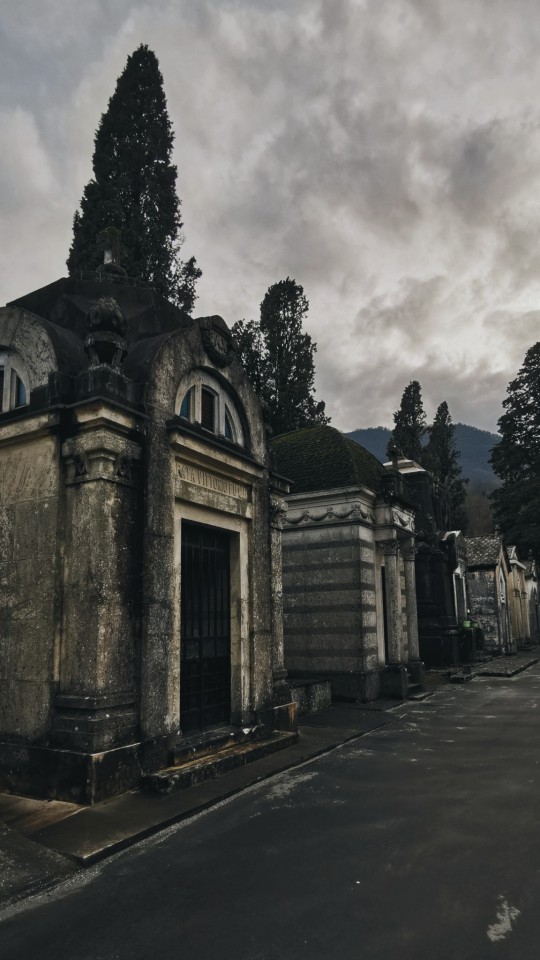

An ordinary cemetery in Italy.
Cicagna's cemetery, Cicagna, Genova (GE), Liguria, Italy.
#cemetery#cicagna#genoa#ligurian places#italy#my pics#beauty in everything#cemeteries are my comfort places
3 notes
·
View notes
Text
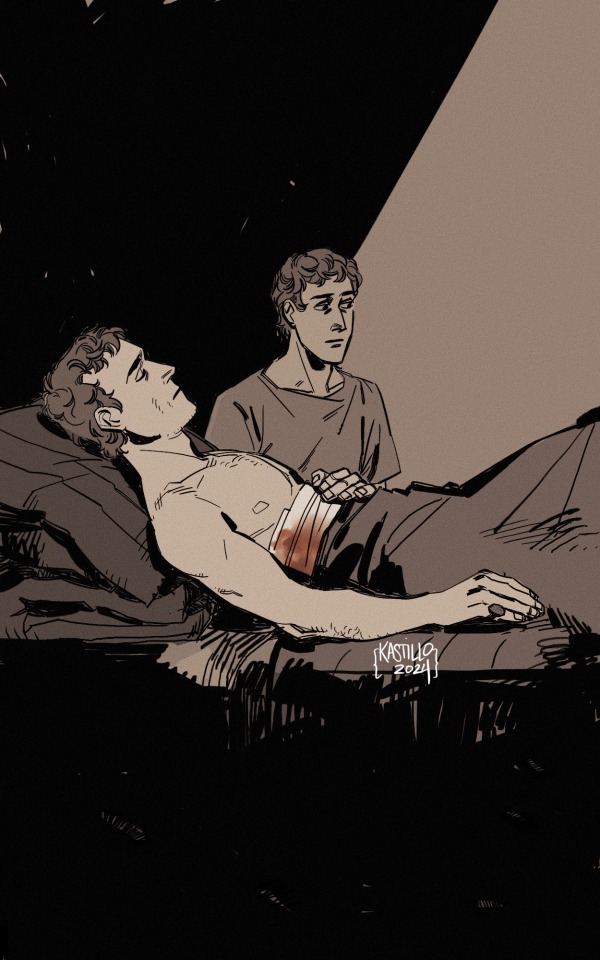
I had an idea awhile back to do comics about Mago (specifically I wanted to do the rings scene, but I needed more context on literally everything), so I was reading Livy (as one does) and honestly. tell me more about how Scipio is wounded and in pain, Livy. you’ve got my complete attention, keep going.
So alarming a sight filled the Romans with dismay, and, to add to their fear, the consul was wounded and was only saved from danger by the intervention of his son, who was just reaching manhood. This is the youth who will have the glory of finishing this war, and be surnamed Africanus, from his famous victory over Hannibal and the Phoenicians. However, the rout was chiefly amongst the darters, the first to be charged by the Numidians: the cavalry rallied, and receiving the consul into their midst, and shielding him not only with their arms but with their persons also, brought him back to camp without panic or confusion at any point in their retreat. (The credit for saving the consul's life is given by Coelius to a Ligurian slave. I should prefer, for my own part, that the story about his son were the true one, and this is the version which most authorities have handed down and tradition has established
&
Scipio could no longer bear the pain occasioned by the jolting of his wound in travelling, and besides he judged it best to wait for the arrival of his colleague, who was already recalled —so he had heard —from Sicily. He therefore chose what seemed to be the safest place near the river for a permanent camp, and proceeded to entrench it.
Livy History of Rome, 21. 46 & 48
also Scipio’s son is here because there’s some real inheritance of violence going on with both sides. that also captures my attention, I guess.
⭐ places I’m at! bsky / pixiv / pillowfort /cohost / cara.app / tip jar!
#also the fucking river keeps getting mentioned like what is this. the road to carrhae. romans: stop crossing rivers immediately#drawing tag#furthermore Carthage must have it’s own tag
153 notes
·
View notes
Text
There are some toys that children always love. One of them is tiny versions of cooking utensils and dishes. Here's some of them found in Catalonia from different moments of history.
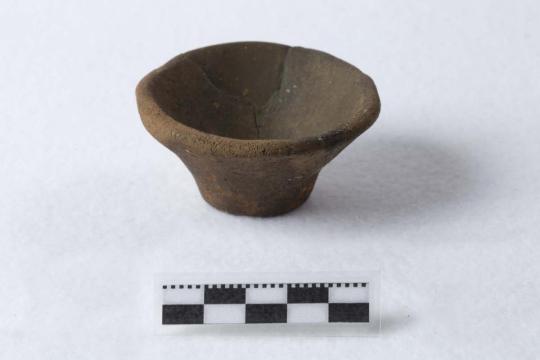

Left: A tiny vase and/or lid (3.2 cm long) made of thick ceramic. Local production, 4th century BC. Museu d'Història de Barcelona.
Right: Little cup (6 cm), made of thick ceramic. Local production, 4th-3rd century BC. Museu d'Història de Barcelona.
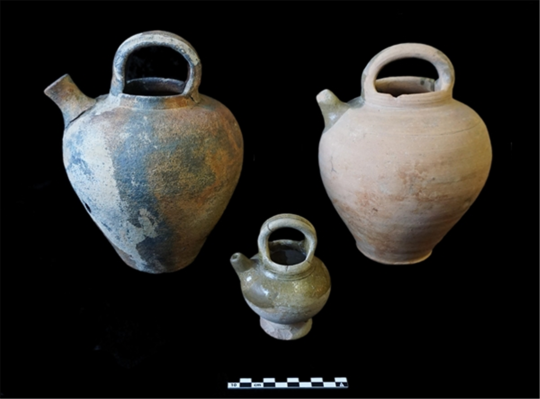
Two pitches and a toy pitch (12 cm tall) found at the bottom of a well. This well was built in the 15th century and was stopped using when the city hall built a water fountain in 1636. The pitches had to be lowered with a string, sometimes the string would snap or the pitch would hit the well's walls and break. For this reason, archaeologists found 145 broken pitches at the bottom of the well, and this toy. Little pitches used by children to carry water have been found before in Catalonia, but this one is so little and would be able to carry such an insignificant quantity that it could only be a toy. Museu de Banyoles.
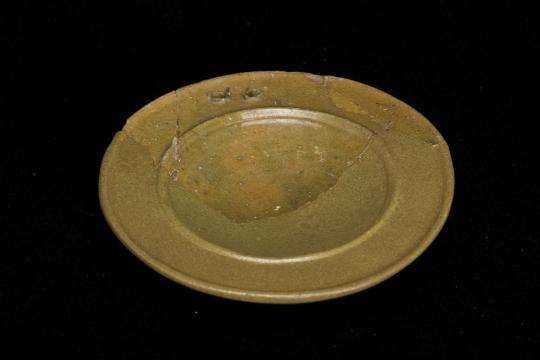
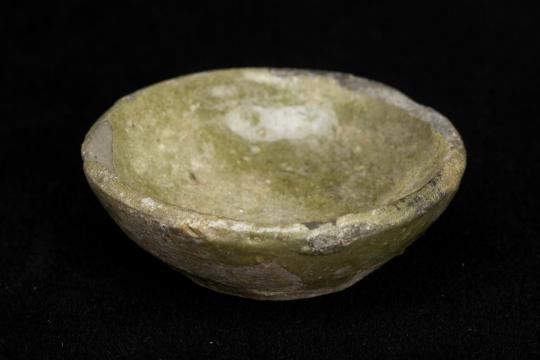
Left: Tiny dish (1.5 cm), imitating the common brown ceramics with green glaze that were common at the time. Local production, 16th century AD. Museu d'Història de Barcelona.
Right: Tiny bowl (1.7 cm). Local production, 16th century AD. Museu d'Història de Barcelona.
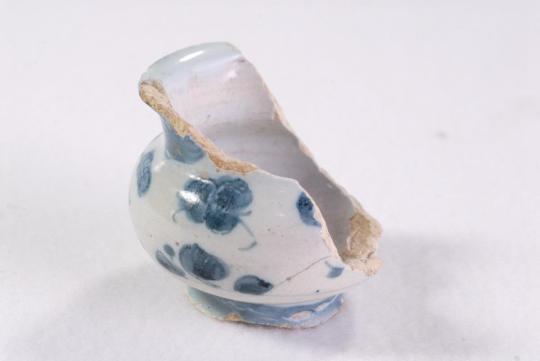
Tiny jar (4 cm). Ligurian maiolica ceramic of the series "a tappezzeria" with "tre nuvolette" decoration. In the base, it has the Savona coat of arms used as a workshop seal. Even though this was made in Liguria (Northern Italy), this was found in Barcelona. At the time, there was a lot of commerce between these two places, particularly for ceramic chinaware, with many upper class families in Barcelona buying imported Ligurian dishes, plates, bowls... It seems like they also did it for their children. 16-17th century AD. Museu d'Història de Barcelona.

Tiny reproductions of common ceramics of the Early Modern period found in el Born archaeological site, 17th century-1717. El Born CCM.

Picnic basket (17 cm long), 1952. Museu d'Història de Barcelona.
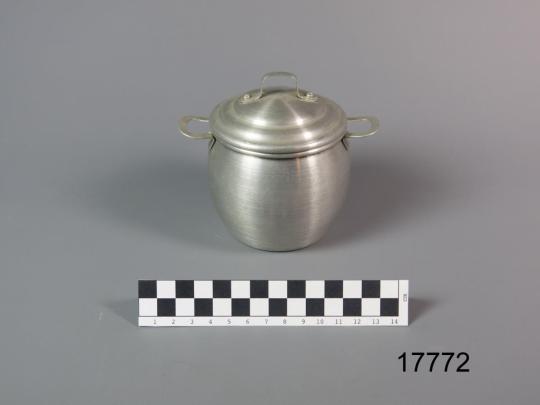
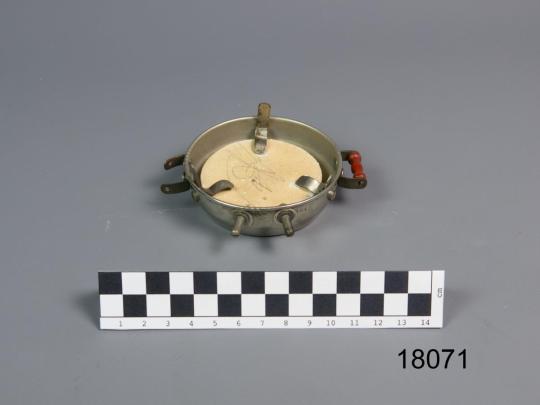

Cooking tools toys: pot (10.5 cm), heater (3.5 cm) and whisk (12 cm). Second half of the 20th century. Museu d'Història de Barcelona: 1, 2, 3.
And thinking of our own childhoods, I'm sure we can all remember some more.
#arqueologia#història#catalunya#archeology#archaeology#history#toys#children's history#pottery#ceramics#museum
299 notes
·
View notes
Photo
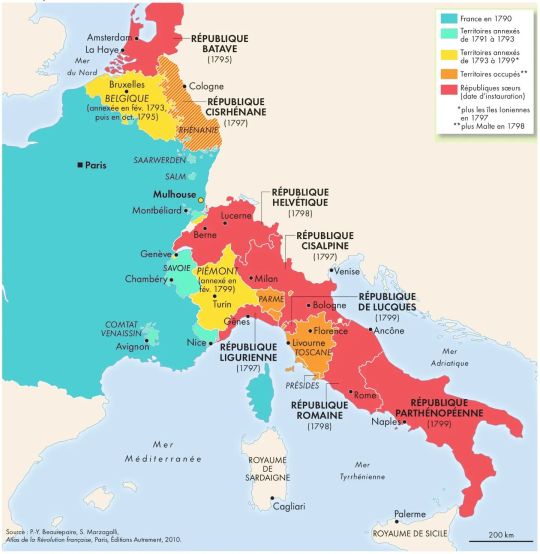
France after the Peace of Lunéville, 1801.
« Nouvel atlas de l’histoire de France », Cohen, Destemberg, Dusserre & Houte, Autrement, 2016
by cartesdhistoire
Belgium was annexed on October 1, 1795, after the United Provinces became a sister republic, theoretically independent (treaty of alliance of May 16).
In Italy, Bonaparte won dazzling victories, and between the spring and summer of 1797, he signed armistices, while Italian patriots took advantage of the offensive to proclaim the republic in Piedmont. The Peace of Campoformio (October 17, 1797) gave Austria the archbishopric of Salzburg and Veneto but confirmed the possession of Belgium and the left bank of the Rhine (from Alsace to Koblenz) to France, finalizing the birth of the Ligurian and Cisalpine Republics. In February 1798, French military intervention allowed Roman patriots to proclaim the Republic. These were allied states – with very formal independence.
In January 1799, the patriots led General Championnet to proclaim the ephemeral Neapolitan Republic which lasted only until June 24. However, after the occupation of Tuscany by French troops, all of Italy except Venice was occupied by the French, and most of it formed republics. The Italian unity desired by the patriots was possible, but the Directory took care, on the contrary, to prevent it definitively: from February 8 to 16, 1799, a referendum took place in Piedmont which gave a strong majority for annexation by France (effective on September 11, 1802).
On February 9, 1801, the Treaty of Lunéville was signed between France and Austria. It confirmed for France the possession of the Austrian Netherlands, the principality of Liège, and the left bank of the Rhine. Austria had to recognize the Batavian Republic and the Helvetic Republic. Additionally, Article 7 of the treaty provided for compensation to the dispossessed German princes, to whom territories would have to be redistributed, thus giving France the position of continental arbiter.
58 notes
·
View notes
Note
Have you seen the seen the headlines lately that they are reanalyzing the Columbus DNA again to figure out his origin?
I did not. So I looked it up!
Most that I found is just confirmations that the bones that are supposed to be his (in Serville) are his. And I didn't know that was such a mystery, I kinda thought it was already confirmed for ages but ig not?
I only saw one article really talking about trying to determine his origin and giving us some theories that bloomed over the year, and, I'm sorry but, most if not all of them are ridiculous imo. Plus, didn't he literally write he was from Genoa?
Would I believe he would have lied on his origin? Yes. I mean, the whole name change was a way to be more accepted imo- if we follow his determined origin (for now), in Ligurian his name is "Corombo" (or Combo, but that works less for my theory lol) which was likely (maybe accidentally) changed to "Colombo" then to "Colòn" and the train chain of other names. It's just my theory that the original 'r' was misinterpreted, but if you're willing to change your first name to Cristobal to be more accepted to the Spainish people, you basically do not care if your last name is changed too.
What I'm saying is that if Columbus would have changed his origin, he would have likely tried to make himself spanish like he "spanished" his own name (just a theory). I don't think he's above it.
Plus, Genoa being his birth place kinda makes sense to me. It was the perfect cocoon for someone like him to develop like he did, you did NOT wanna be in Genoa at that time. (I remember being told that there was a weird anti color cult, so he was a sad beige baby and that's still is a private joke with my bsf. I wish I could find confirmations on this)
What am I trying to get at? Honestly, I just don't think we'd learn anything new or anything at all. I guess it's great that what we thought were his bones actually are his bones. But for his origins? I do not know. In his story, it's very hard to find reliable narrators. We cannot fully trust his own writing, or his son's, or his brother's, or the sailors', or anyone I fear. Everything is a mix of what is most believable/accepted, what would have been the case and what wasn't told.
And now, I'm asking myself- does it matter? Will it change anything? His origins, that I still believe are Genoese, may be a mystery for some, but is it our greatest concern? Would it help us determine his actual birth name, that he seems to have a sick pleasure hiding- or maybe a birth date? We don't know that too!
But the biggest thing is, will that even impact the general public at all? We live in an era post Columbus propaganda, where multiple books and movies are made to make him be the hero.
What if he turns out to be Polish? Will that change anything? Will Genoa unclaim him? Will Poland claim him instead?
Will that little detail of his history do anything? I mean, not to bash anyone that is truely hyped by that! But, I'm not...
Tho if he turns out to be king Ferdinand's brother like I saw one theory say, that will really be something LOL!
6 notes
·
View notes
Note
Hey bestie! First time asker first time fan!
SO!
I have a mythical monster and creature question about Italy. See, I like making monsters and characters based on different Monsters and Mythology. (Ex: Wereanimals, Fairies, the Unicorn, Bigfoot/Sasquatch, Witches, Etc....) and sometimes, I will get inspired by characters/media that will make me design said creature (Susie from Summer Camp Island and James from Derry Girls for my Witches. Mean Girls for my Unicorn.) OTHER characters like that....
well THIS time. Because Tiktok has been showing me pics of Titanic and movie-related Titanic stuff. Then I got fixated on Danny Nuccis character of Fabrizio from the Movie. POINT is. I wanna make a character is more of a base italian character and go more in depth of italian culture and childhood (as I do for all of my characters). DO you have any refs or monsters/Mythology from Italy that is kinda like monsters and were-animals or creatures? And not like- ghosts from other real people or demons from hell and the underworld. Please and thanks!
YAYY questions about italian characters! Ok let me think... YES. But you have more choices. As you can see, Italy quite differs from north to south and both north and south had different influences. Northern regions were influenced by celtic, etruscan, ligurian and venetian folklore being homeland to many celtic tribes before (north Italy was called Cisalpine Gaul by romans) and lombard people (Germanic people from Scandinavia) after. South is instead very influenced by etruscan, roman, arabian and greek folklore! Sardinia aside being so isolated they actually have a super colorful and ancient folkloristic world. It's very hard to walk around demons, ghosts and so on, since christianity really changed our folklore for good, but I found something underneath:
Lupi Mannari
-We have a lot of werewolf stories in Italy, we call them Lupi Mannari. Two recent cases even in the legend: Pasquale Rossi, so called Werewolf from Villa Borghese. Or Iolanda Pascucci, called Wolf of Posillipo. The woman got married and they put her in a sanatorium. She ran away, hiding in Napoli, scared she might have passed the curse to her children.
-Very specific Werewolf from Basilicata:
Lu Lupi Minaro
Cursed to be transformed under a full moon, for being born on Christmas Eve, while the bells of Christmas were tolling. You can be cured if a brave man stings you and takes some blood drips from you.
L'Uomo Cervo (Gl'Cerv)
-From the ancient Etruscan and Celtic Folklore we have a Deer Man, L'Uomo Cervo (Gl'Cerv), from Castelnuovo al Volturno (Molise). Every year in this place they have a festival called DeerMan Carnival: a monstrous hybrid Deer-Man roams the city, hunting down people. But (as a symbol of rebirth and seasons changing) he gets defeated and dies. He will reborn the next year, he is the Winter and the Death, getting defeated so the season can change again and the new year come.

The influences are from Cernunnos, a god from celtic folklore, symbol of wild animals, natural force but also death and afterworld. Defeating the death you leave again space for new life, in Spring. (Maybe he's not literally a were-being but I think you can tiptoe around the concept. He is one and almighty tho, so I don't think you have MANY of these. It's like a god, a spirit, so you will have just one Were-Deer per sacrifice.)
-From Sardinia:

The Coga (or Bruxa)
Unaware people, born as Coga can transform into one at night. Imagine a mix between a witch and a vampire. Long hair, a little tail, long nails and a hairy cross on the back.
Even if you are born a male or a female, when a Coga you become an old ugly woman, which can transform herself into a dog, cat, snake or an insect. Revenge and anger feeling could bring people to actually become a Coga even if not born one, the wannabe Coga have to perform a ritual:
Must go to a graveyard and take away from a fresh c*rpse some body fat; mix it with virgin blood and holy oil. Then cover some body parts and the metamorphosis begins
Su Boe Erchitu
Instead of transform yourself into a wolf, you get transformed into a monstrous minotaur-thing, with two metallic horns and two candles on the tips. The only way to break the curse is to estinguish the two candles.

From Sicily:
Donas de fuera
Mostly women but not exclusive. Very beautiful, dressed in white, red or black. The feet can be cat-like, horse-like or strangely round feet. Roaming in groups, the man of the group plays liute or guitar while the others dance. Donas can transform into cats or Aydonos, an offensive version of themself, being able to kill. You don't offend a Dona. Do not disturb them or trick them to gain something. They can also transform into incorporeal mass.
Heavily inspired by nimphs and leprecauns from ancient greek, clearly, but with a nordic celtic influence. Very nice mixing.
This is everything I found so far, but keep in mind that Streghe, Masche, Bruxe, Janare etc etc can ALL transform into animals: cats, dogs, crows, owls, snakes. It's very common for witches to transform into animals. Hope I helped!
Sources:
6 notes
·
View notes
Text

Focaccia (UK: /fəˈkætʃə/, US: /foʊˈkɑːtʃ(i)ə/, Italian: [foˈkattʃa]; Ligurian: fugassa, Ligurian: [fyˈɡasːa]; Barese: fecazze, Neapolitan: [fəˈkattsə]) is a flat leavened oven-baked Italian bread. In some contemporary places, such as Rome, it is a style of pizza, also called pizza bianca (lit. 'white pizza'). Focaccia may be served as a side dish or as sandwich bread and it may be round, rectangular, or square shape.
4 notes
·
View notes
Text
Scary Monsters
Okay, @dysphoria-sweatshirt @sweatersexual @30spiders @angrylittlesliceofpizza
Part 1/? - Rocco’s Closet
Part 2/? - School for Monsters
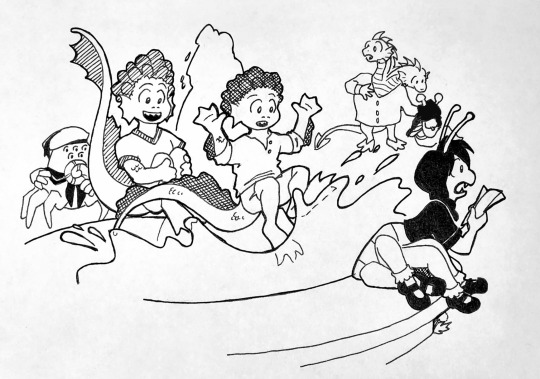
Knowing that the bus was going 'back to school', Luca had pictured something like the school he and Giulia attended in Genova. It was housed on several floors of an ornate old building, on a street that also housed shops and apartments. Humans seemed to like living all piled on top of each other in small spaces, so that everything and everyone they might need was within easy reach. For somebody accustomed to the broad, shallow bottom of the Ligurian Sea, it had taken some getting used to.
This place was not like that. The building, identified by a sign as Flatwoods Middle School, was only a single storey tall, with flat roofs and very few windows. There was a broad open field behind it, where a group of monster children were playing something similar to football. In front of the building was a big car park with rows of young trees and a small fountain on the broad path to the front door.
The fountain was a welcome sight, because by now Luca and Alberto were starting to dry off again. They pushed their way through the kids leaving the bus and ran ahead to jump in the water, rolling around and splashing to get good and soaked.
Unfortunately, there'd been a girl sitting on the fountain rim reading a book. She had eight spidery legs but a humanoid torso and hair in pigtails, and she was wearing a black cardigan with a lace collar and a ribbon choker with an Egyptian ankh. She shrieked as they splashed her, and scrambled to her many feet.
“Sorry, Miss!” said Luca.
She stared at them, uncomprehending.
“We're sea monsters,” Luca added.
“Not good if we get too dry,” Alberto agreed.
The girl examined her wet book and brushed some water off a page, then scuttled away.
“Will you need to keep doing that all afternoon?” asked Jeanne, as she and Marie ushered the kids towards the buildings.
“Yes, Miss Lavigne,” said Luca.
“We'll see if we can't make it easier for you,” Marie decided. Jeanne nodded.
Alberto climbed out of the fountain and put his hands on his hips as he considered the building in front of them. “It doesn't look much like your school,” he observed. Luca had sent him some photographs in the mail.
Luca nodded. “I don't think it's gonna be much like it inside, either.”
Alberto stood there a moment longer then clapped Luca on the back. “It'll be a breeze,” he said, though there was uncertainty in his voice. “Just...”
“... just stay wet?” Luca guessed.
“Right.” Alberto nodded and followed the monster children indoors, head and tail held high. Luca hurried after him.
Flatwoods Middle School had looked quiet from outside, but inside it was absolutely swarming. Monster kids of every possible shape and size were taking things out of lockers or putting them in, talking in groups, or engaged in any of a dozen other activities. Three girls, dressed in uniforms tailored for their varying number of limbs and heads, were poring over a piece of paper and giggling helplessly. Two slug-like beasts, one in a baseball cap, were bouncing a small ball back and forth with their heads, until a red, crocodile-like adult came and confiscated it. A polka-dot creature was fiddling with colourful cube toy as the group went by, and one of the returning kids waved to it.
“Darse por vencido, Miguel!”
The being called Miguel waved back, then returned its attention to its cube.
Alberto decided to try this phrase out. He poked the armoured back of a spiky yellow creature that was holding a large orange ball. “Hey, darse por vencido!” he said with a cheerful grin.
“Uh... sure,” the spiky kid said uncertainly.
An alarm suddenly rang. Luca nearly jumped out of his skin. He grabbed Alberto's arm, but nobody else seemed to consider this an emergency. The students shut their lockers and quickened their steps – or their flapping, hopping, or slithering – but they didn't flee the building. Instead, they ended their conversations with their friends and dispersed into various rooms. Luca kept a tight grip on Alberto as they followed their lifelines, Miss Lavigne and the crab boy named Harry, through a particular door.
Inside was a classroom that looked fairly normal at first, but then Luca began to notice the weird details. One wall had a map hanging on it, but it wasn't a map of anywhere Luca recognized. In another place was a poster labelled The Night Sky, but there were no familiar constellations. Above the blackboard was a row of portraits of monsters in old-fashioned clothing.
The desk, however, were entirely familiar, and the students settled down at them much as students did anywhere. Marie-Jeanne ushered Alberto and Luca to two empty seats at the back, where there was a sink on the wall.
“There we go,” said Marie. “There's water right there, if you need to wet down again.”
“Just try not to disrupt the class too much,” Jeanne added.
“Yes, Miss Lavigne,” said Luca politely.
“We'll be as quiet as mice,” Alberto promised.
Both of Marie-Jeanne's heads nodded, and she went to the desk at the front to begin the lesson. “Well,” said Marie,” since on a regular day this would be our period for history, let's talk about what we learned at the factory today in light of that. Who can tell me something about the history of the energy industry?”
A scattering of hands, tentacles, wings, and at least one foot went up.
“Yes, Heather.” Marie pointed to a girl.
The child in question rather looked like a heather plant, with spiky fur in green and pink. “Scream power was rationed in some places until just five years ago, as a result of the Great Door Crash!” she announced.
“That's correct,” said Marie pleasantly. “We grew up in a small town with rationed scream, actually.”
Jeanne, meanwhile, chose one of the boys. “Arthur! What can you tell us?”
Arthur was a glossy green slug-like creature with skinny arms and a pair of curling, ram-like horns. “Today was the first Code Black in monster history!” he said excitedly.
This was met by an awkward silence.
“I think that's a little premature,” said Marie primly.
“It's possible,” Jeanne admitted.
“But not likely,” said Marie.
“Everybody in the parking lot was talking about it,” said Arthur.
“That doesn't mean it's anything more than a rumour,” Marie told him, while Jeanne nodded. “If anything actually happened, I'm sure there'll be an official announcement.”
“Or maybe there won't be,” said a girl who looked like nothing so much as a dish of blue jelly, with eyes and a pink bow on top. “Maybe they'd hide the truth in order to avoid a mass panic. You all know humans are deadly poisonous.”
Luca looked at Alberto and found him looking back, not sure what to make of any of this.
“You mean venomous,” said a striped, gecko-like boy, who was wearing glasses. “If it bites you and you die, it's venomous. If you bite it and you die, it's poisonous.”
“What if I bite it and it dies?” asked Arthur.
“Then you're venomous,” said the boy in the glasses, rolling his eyes. “Duh.”
“Humans aren't venomous or poisonous,” another kid announced. “It's just that their mouths are so filthy that after one bites you die of infection.”
The jelly waved a dismissive hand. “Either way, why would they tell us and risk society collapsing when they could just quietly kill anyone who got contaminated and cover it up? There might have been dozens of incursions and we would never know.”
Luca was still damp, but he got up and sidled over to the sink to splash himself again. Alberto did likewise. A few kids looked back over their shoulders at them, but nobody seemed terribly interested.
“Okay, kids,” said Jeanne, raising her hands. “Why don't we just...”
“We should ask Harry,” Arthur volunteered. “His family owns the place.”
Alberto and Luca were forgotten entirely as all eyes – averaging more than two per individual – turned towards the grey crab-like boy.
“I don't know any more than you do,” Harry told them. “If there was an incident, Dad might say something about it at supper tonight.” He glanced at Luca and Alberto as they returned to their seats, but his eyes didn't linger on them. “If he does, I'll tell you about it tomorrow.”
“Yes, but will you tell the truth?” asked the jelly. “You have a vested interest.”
“I'll tell you whatever I find out, Michelle,” Harry huffed. “On my honour.”
“What is honour worth when it comes from the establishment?” asked Michelle.

“Enough!” barked Jeanne, and to Luca's astonishment she breathed a bit of fire. Even Marie seemed shocked by this, and the class recognized it as a sign that their teacher was losing her patiences. They quickly sat up straight and looked attentive.
Marie gently took over again. “Why don't we go back to what Heather said about the Great Door Crash?” she suggested. “Who wants to tell me about that?”
There was less enthusiasm now. For a moment nothing happened, and then with a sigh, one grey hand went up.
“Yes, Harry?” Marie asked, while Jeanne held her mouth shut and exhaled smoke through her nostrils.
Harry looked around smugly. “Between 1939 and 1945 over a hundred thousand closet doors lost their access to the human world. But my grandfather Henry Waternoose the First developed a more efficient way to store and distribute every decibel of scream power that remained, and founded Monsters Incorporated to rebuild the door bank so that now there's more scream than ever.”
“Thank you, yes,” said Marie.
Jeanne sighed, letting out a final cloud of grey smoke that gathered in the air above her. “Yes, very good, Harry, although it would have been nice if somebody else could have answered that. Socorro, do you have a question?” she pointed to a lizardlike creature with spines down its back and big red eyes, which had raised a webbed hand.
“Why did the doors fail?” Socorro asked.
“Nobody knows,” Marie told her. “It's still a bit of a...”
It felt like lightning passed down Luca's spine as he realized he knew the answer, and before he had properly thought about what he was going to do, the habit of school took over and his hand shot up. “They had a war!” he said.
Everybody stared at him.
“Who?” asked Jeanne.
“The humans,” said Luca. Belatedly, he realized he probably shouldn't have said anything, but he'd already started now. There was no going back. “That's, uh... that's what my uncle says. They had a big war that went on for years, and thousands of buildings were destroyed, so their closets would be destroyed, too.” He was starting to put this together. The monsters used closet doors to get to the human world and... make kids scream? Because they used it as power for something? That sounded weird, but Luca didn't actually know where humans go their electricity from, although it had something to do with lightning, so who was he to say?
“Well, that's certainly an interesting theory,” said Marie delicately.
Luca sank in his seat a little, as everybody gave him funny looks. That had happened before, when he'd tried to answer a question in school and had ended up saying something humans thought was weird. Everybody was staring, wondering what was wrong with him, and he wished he could disappear.
Despite that embarrassment, by the time the class was over Luca was pretty sure he had this figured out. In order to get back to Portorosso, all he and Alberto had to do was go back to the factory and find the door that led to Rocco's closet. It would be easy.
The bell rang, and the kids scooped up their books and filed out of the classroom. Luca and Alberto stopped to wet themselves down in the sink one last time, and missed some minor drama in the process. Somebody shrieked, and they turned around to see the blob named Michelle pointing an angry gelatinous finger at the gecko boy.
“Miss Lavigne!” she wailed, “Lewis stepped in me!”
“You stopped right in front of me!” Lewis protested. He shook a wad of goo off his foot. It dropped to the floor and rolled across it to join back up with the rest of Michelle.
“You'd have seen me if you were looking where you were going, instead of reading a book!” Michelle informed him.
The two continued to argue as they headed into the hall, leaving only four people in the classroom – or perhaps five, depending on whether one counted Marie-Jeanne as one or two. There was the teacher, the boys, and Harry Waternoose.
“Follow me,” Harry told them.
Luca no longer had misgivings about this. If Harry's father owned the factory, then they had to stick to him like barnacles. They would just have to be very careful not to let him see them dry.
“Sir,” Luca said, as Harry led them up the hall, “we need to go back to your father's factory.”
Harry scuttled up to a locker and opened it. “What for?” he asked.
“We, um... let something there,” said Luca.
“I can tell Dad to have people look for it.” Harry stashed some books and picked up a bag, then shut the door again.
“You can't,” said Alberto. “It's hidden. We have to get it ourselves.”
Harry looked suspicious, but for the moment he did not ask any questions. Instead, he made his way through the teeming hallways to the entrance. Alberto and Luca were still good and damp, but seeing this crush of people and knowing now what would happen if they transformed made them jumpy. When they passed a drinking fountain, Alberto took advantage of it to splash his face, then put his thumb on the nozzle to spray Luca, too.
Unfortunately, not all the water went where he intended. Luca heard a startled cry and spun around to see that some of it had hit the spider-like girl in the ankh necklace. She glared at them.
“Sorry!” said Luca.
She wiped water off her face, then scowled and scurried away.
In front of the building, students were running around or sitting on the grass and talking, or getting onto one of a line of yellow buses that were now parked waiting on the street. Luca wasn't looking forward to riding in one of those again, so he was relieved when Harry didn't go in that direction. Instead, their new friend led them to the parking lot, where there was a car waiting.
At least, Luca was pretty sure it was a car. It was car-shaped, and yet very different from the little cars he was familiar with from Portorosso and Genova. It was black, low to the ground, and very, very long, longer than Massimo's fishing boat. The windows were dark so they couldn't see inside, but then one slid soundlessly open to reveal the driver, who appeared to be a blue octopus with a handlebar moustache.
“Hi, Armstrong,” said Harry. “This is Luca and Alberto. They're coming over.”
“Of course, Master Harry,” said the octopus.
They climbed in. Luca had ridden in cars before, and had found them cramped and uncomfortable. This one, however, was spacious with big soft seats that were almost more like sofas. They sat down, and Harry opened a little door under the seat and pulled bottles of cold water out of a tiny refrigerator for them.
“Thank you,” said Luca politely.
Alberto opened his bottle and poured the contents over his head. “So was that different from your school?” he asked.
“Kind of,” Luca said. “My school is smaller, and we learn about different things, but we do sit at desks and do math problems, and there are maps and things like that.”
“That's it? All day?”
“Mostly. We stop for lunch, and once a week if the weather's good we go back at night to use the big telescope.”
“And that's fun?” Everything Alberto knew about school was from Luca's letters, and Luca loved school. They read stories, learned history, did experiments, and looked at the stars – every day brought something new! But now Alberto was looking at Luca like he was crazy.
“Yeah, it's amazing!” Luca said with great enthusiasm. “Didn't you learn a lot today? We learned about the Great Door Crash.” He started counting things off on his fingers. “We learned that scream power works by vibrating the air molecules, so everything here runs on sound! And we learned that before they learned to get power by scaring kids, monsters would make machines run by roaring into them!”
“Why would we ever need to know any of that?” Alberto asked. “Nobody back home does things that way.”
“It's fun just to know it,” Luca insisted. “Don't you like knowing that plants are green because the green chemical helps them absorb sunlight, or that the evening star is a whole planet and has phases like the moon even though you need a telescope to see them?”
Alberto blinked at him, and Luca got a sinking feeling. If Alberto thought school was boring, did that mean he didn't like Luca's letters?
“You don't go to school?” Harry asked with a frown.
“Nope!” Alberto sat back with his hands behind his head. “That's Luca's thing.”
Now it was the monster boy's turn to look puzzled. “What do you do all day?”
“I work for my Dad,” Alberto replied. “My new Dad. My old Dad left, but I got a new one.”
That just confused Harry further. “How did you just get a new dad?”
“I moved in with him, and after a while he let me call him that.”
Harry gave them a sideways look with all five eyes. “Where are you guys from?” he wanted to know.
Saying the human world was clearly out of the question. Would Harry know where Portorosso or Genova or even the Ligurian Sea were? The map in the classroom hadn't shown anywhere familiar. Monsters clearly know how to get to the human world, though, so what if somebody tracked them down?
“Milano,” said Alberto.
“Yeah, Milano,” Luca agreed. He looked at Alberto, and Alberto shrugged. Apparently it was just the first place he'd thought of.
The very long black car drove them through the city and out into a neighbourhood with lots of trees and fences. A wrought-iron gate swung open by itself, and they headed up the drive to a house even bigger than Flatwoods Middle School. It was three storeys tall, surrounded by geometric gardens and carefully trimmed trees. It resembled a countryside villa, the sort of places Luca and Alberto had only seen pictures of. Harry cheerfully thanked Armstrong the chauffeur and scuttled up to the door. His guests followed, and before they reached the step, the butler was already there to answer it.
There seemed to be all kinds of monsters in this world and Luca was trying to act like that was normal – nobody seemed shocked by their appearances, so it would be rude to be surprised by anybody else. Even so, he couldn't stop a frightened squeak at what he saw next.
He had heard the word 'cadaverous' used to describe somebody who was very thin or pale, but the creature in the black suit that held the door for them literally looked like a dead body. It was huge and hunch-backed, with blue-grey skin, white hair, and blank white eyes. Making things even worse was that it was otherwise the most human-looking creature they'd met since Louise had dragged them through Rocco's closet door. If Luca had seen this come out of a closet, he'd have screamed enough to keep a whole city lit for a week.

“Hi, Schrecklich,” said Harry.
The butler nodded slowly, once, without speaking.
“This is Luca and Alberto,” Harry added.
Alberto stood up as straight as he could and grinned awkwardly, trying to look brave. Luca kept partially behind him, and waved.
“We're going in the pool,” Harry added.
Schrecklich nodded again, and turned his head to watch them go by. The boys walked fast and kept their eyes in front, not wanting to look directly at this terrifying creature. The door opened onto a big tiled hallway with intricate carpets on the floor and two flights of stairs leading up to the second level. The ceiling was as high as the third story, with balconies looking down and a stained glass dome at the top. From the centre of the dome hung a glittering crystal chandelier.
“I'm gonna go get my trunks,” Harry told them, as they stood staring at the room. “You can head out back. Schrecklich will show you the way.” He headed up the left flight of stairs.
The boys swallowed and turned to the butler, still not wanting to meet his empty, staring eyes. Schrecklich grunted, and gestured for them to follow him.
The rest of the house was as palatial as the foyer. They passed through half a dozen rooms stuffed with stylish furniture, with thick carpets on the floor and artwork on the walls. In one, a creature dressed as a maid was vacuuming. She had eyes on stalks, one of which turned to watch them go by, but when she saw they were with Schrecklich the butler, it rejoined its mate in keeping track of the cleaning.
Alberto tried very hard to look as if he were too cool to be impressed by this, keeping his lids half-shut and his head facing forward, but Luca could see him glancing around out of the corners of his eyes. Luca himself couldn't help but staring in amazement, and very nearly fell behind once or twice. Each time, as soon as he realized the others were getting ahead of him, he would run to catch up, because this house looked like a place somebody could get lost in and never find their way out. Sea monsters had an innate sense of direction that always told them which way was home, but that didn't help much in an actual maze.
At last the butler slid a glass door open, and they stepped out onto a multi-level wooden patio surrounded by flowers and palm trees. In one spot was an elaborate cushioned swing, in another a hammock, and on the lowest level was a firepit surrounded by comfy-looking ottomans. The centrepiece was a kidney-shaped swimming pool with a diving board, surrounded by beach chairs and sun umbrellas.
“Cool!” Alberto declared, and dived right in, clothes and all.
Luca paused before following him. “Thank you, Sir,” he said to the terrifying butler.
Schrecklich grunted again, and turned and went back inside.
Entering the pool brought on an immediate sense of relief. As long as Luca and Alberto were actually in the water, they wouldn't have to worry about being seen drying out. For the moment, at least, they were safe.
“Can you believe how rich these people are?” Alberto asked, kicking water at Luca with one flippered foot. “I bet they've got a whole fleet of Vespas!”
“Harry did say his dad owns the factory,” Luca said. If the screams were the only source of power, and the factory provided all the screams, that made sense. Luca wondered again about electricity. Where did it come from? Were the humans who provided it rich like this, or did it work totally differently? “I hope he can get us in without getting caught.” They hadn't seen much of it but the factory looked pretty big. Were they going to be able to find Rocco's door again?
“He'll do anything we want,” Alberto said confidently. “We promised to show him two humans, remember?”
“You promised,” said Luca, still not sure about that plan.
“We'll be home in no time,” said Alberto, floating on his back. “Until then, we get to hang out in this palazzo!”
Luca had other things on his mind. “I wonder what people back home are thinking. I mean. Signora Marsigliese would have heard us all shouting and she must have come in and we were just gone.” He hadn't thought of that yet... now that he did, it made him want to panic. “Mom and Dad are gonna be freaking out. And Massimo...”
Alberto must not have thought of this either. He stood up with his feet on the bottom. “You think so? Yeah...” he looked uncharacteristically thoughtful. “Yeah, he'll be looking for me.” Luca had told him how Massimo had gone to search for Alberto when he'd run off after their argument, and Alberto had told him what had happened after the boat caught fire.
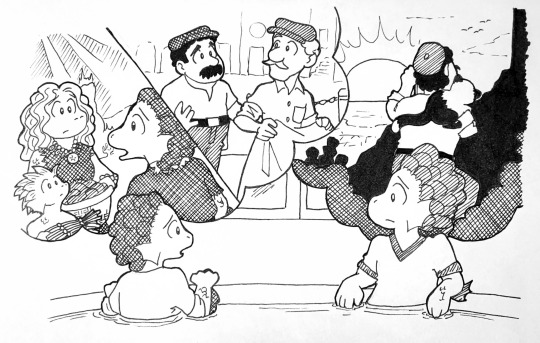
The glass door slid open again, and Luca and Alberto looked up to see Harry scuttling out onto the patio. He hadn't worn any trousers earlier, but now he had blue swim trunks made to accommodate his many legs. Around his waist was a colourful, tyre-shaped inflatable thing, like a malformed beach ball. When he hopped into the water, it kept him buoyant, and he paddled over to them.
“So when do I get to see these humans?” Harry asked.
Luca looked at his friend. This had been Alberto's idea.
“Tomorrow,” said Albert. “Once you get us back into the factor.
Harry nodded and smiled, showing off teeth even sharper than the sea monsters'. “I figured,” he said. “That's what you hid there, isn't it? The humans? Right?”
Something in Luca's chest tightened. This had already been a bad idea and now he felt like it was getting worse. What was Harry going to think if he figured it out? Or worse, what if he didn't believe they could show him a human, and just threw them out? Luca had never been very good at lying. It was too hard to remember what he'd lied about and make sure it all made sense together, and his mother was too good at finding those holes.
“Um, yes,” Alberto decided. “Yes, they are, and we'll show you tomorrow.”
“I knew it!” Harry said triumphantly. “Why did you bring humans into our world? You must know they're dangerous.” The words were reproachful, but the tone was intrigued.
“They're not, though,” said Luca, desperate to tell the truth about something. “All those things people were saying in class, that they're venomous or will shock you or make you sick, none of that is true.”
“It isn't? How do you know?” Harry asked.
“Because we hang out with humans all the time,” said Alberto. “Some of our best friends are human. My Dad is human. My new Dad. My old dad was a sea monster.”
“I go to school with humans,” Luca agreed.
“And that's... normal?” Harry couldn't believe what he was hearing.
“Um.” Now Luca hesitated. “Not exactly.”
“It's not really common,” Alberto said. “We're from just about the only place where humans and sea monsters get along.”
“In Milano,” said Harry.
“Yes, Milano,” Luca agreed.
“Will you take me there?” Harry asked.
“Well...” Faltering for the first time, Alberto looked at Luca for help.
Luca shook his head. “I don't think so.” It was a bad idea for many reasons, but he picked the one he thought Harry was most likely to agree with. “I don't know if we'd be able to get you back. The lady who found us, Louise, she said they would have to review the door we came in by. So they might get rid of it. It's not worth the risk.”
Harry, however, was not worried at all. “I know where they keep the doors for review. It'll be easy to find it. We'll just wedge it open. They can't deactivate an open door. There are safety protocols.”
Luca tried again. “The humans will be scared of you. You're not like the monsters they know.”
“Giulia's cool,” Alberto offered. “We'll just tell her Harry's a friend of ours, and she'll be fine.”
“Yeah, but it's not Giulia's house,” Luca pointed out. “It's Signora Marsigliese's house, and it's Rocco's room.”
“We'll figure it out,” Alberto said.
Maybe Alberto was just stringing Harry along. They did very much need for this boy to keep being nice to them. Once they got back to the factory, they could find a way to ditch him. Luca would feel bad about that, but taking Harry to Portorosso would be such a disaster, it actually made him feel a little sick.
#fanfic#pixar luca#luca 2021#monsters inc#monsters university#luca paguro#alberto scorfano#scary monsters
23 notes
·
View notes
Text
"List of ancient Ligurian tribes" Wikipedia article lists the proto-ligurians as being indo-european, which is not known at all; the "Mont Bego" page furthermore claims that the etymology of bego is Indo-European (they say from PIE *beg "divine", is that even real? Can't find it in Wiktionary at least -- do they mean bʰeh₂?), with no source at all. that etymology claim doesn't even make sense in the first place. Like is it Italian? It's not straight from PIE lol
36 notes
·
View notes
Text
@seachant liked .
the beach shore just off the ligurian sea is a very familiar place for ercole. on this side of town , opposite of the docks , fishermen tend to stray away out of superstition. it's always the heebie - jeebies with the townfolk [ . . . ] passing up a beautiful view of il mare just because of some old stories. whatever —— more for ercole !
resting back on the sand , he just about drifts off into his thoughts when he hears a distinct splashing off to his right. what's this ? someone invading his happy place ? well , that just wouldn't do.
slightly irritated , the man pulls himself off the ground and marches over to a wall of rocks — peering over to see who could be trespassing. eyes land on a feminine figure , draped by her long , wet , vibrant red hair. confusion strikes .. ercole doesn't recognize her.

whoever this was , she was certainly not welcome. ❝ ehi ! ❞ he calls out to her , waving a hand. ❝ what d'you think you're doing here , eh ? ❞
#il mare=the sea; ehi = hey#seachant#hi!! i hope this works for you! lmk if not :>#* 🛵 ☆ミ 𝘾𝙃𝘼𝙈𝙋𝙄𝙊𝙉 𝘾𝙊𝙈𝙄𝙉𝙂 𝙏𝙃𝙍𝙊𝙐𝙂𝙃 ! ́ - ic .
2 notes
·
View notes
Text
World building and theories of Engage
The Dishes of Solm
The dishes of Solm reflect the Mediterranean and Arabian influences in the cuisine of Sicily, the country Solm is inspired by. These dishes fall into various categories:
Special occasion food eg; milk nut pie, tiramisu,
Cold food suitable for the hot climate eg; chilled vegetable soup, berry sauce panna cotta,
Sharing food eg; classic pizza, seafood paella,
Easy to create and preserve eg; salt pork, meatballs and beans, tomatoes in sweet vinegar
Street food/take away food eg; soft candies, churros
Milk Nut Pie - This dish seems to be inspired by baklava. The foundation of all baklava, whether it is Mediterranean or Arabia, is: nuts, dough, butter or oil and syrup. Traditionally baklava is served at special occasions and was considered an aphrodisiac because of the ingredients.
Rice Nut Pudding - This dish seems to be inspired by zarda. Zarda can be served as a celebratory dish. The simplicity of the recipe and small number of ingredients make this a meal that can be enjoyed by commonfolk and nobility.
Dome Bread - This dish seems to be inspired by Panettone. Panettone is served at special occasions because of the long time it takes to prepare.
Chilled Vegetable Soup - This dish seems to be inspired by gazpacho. The reason the soup is cold is to reflect the hot weather of Solm. It is a refreshing soup that can be made with any fruit and vegetables available, traditionally tomatoes are the star ingredient.
Prosciutto - These thin slices of ham can be enjoyed as a light meal by themselves, placed in a sandwich or panini, in salads or as an antipasto. The uncooked ham suits the hot climate.
Kebabs - This dish is inspired by chicken kebabs. From the amount of meat Timerra consumes and the different places she cooks her kebabs it is clear that meat is plentiful. Kebabs can be marinated in a variety of spices and sauces to maintain moisture. It can be simply made as well as being as complex as desired.
Seafood Paella - This dish can be with simple ingredients or with complex flavours. Paella is a Valencian word that means ‘frying pan’, it is named after the fact it can be cooked in just one pan. In the Mediterranean it is traditional to create huge paella to share at festivals or village gatherings.
Meatballs and beans - This dish seems to be inspired by Cannellini bean and meatball stew. Just like the paella in that it can be made and served in one pot. Large quantities can be made to share at festivals. Stews and paellas are great for using up leftovers and ingredients of less quality.
Tiramisu - The name comes from the Italian ‘tirami su’; 'pick me up'. One slice of this Italian dessert is meant to cheer you up. It is often eaten as a celebratory treat. The great is always meant to ‘pick you up’ in another way because it is considered an aphrodisiac.
Berry Sauce Panna Cotta - The name means ‘cooked cream’ in Italian. This dish represents culinary artistry and elegance. It can be served as a snack or as a dessert to finish a meal. It is served cold, perfect to refresh in the Solm weather.
Seafood medley with garlic - This dish seems to be inspired by Cioppino. The word “cioppino” comes from the Ligurian dialect “ciuppin” and means ‘chopped to pieces’. This stew is easy to make and is the ideal meal for mariners and port workers in Solm.
Fried Sardines - This dish seems to be inspired by ‘Sarde Fritte’, Fried Sardine Fritters. They can be served with a dip or with various sidedishes such as rice or salad. They are quick and easy to create.
Vegetable Stir Fry - This dish seems to be inspired by ‘sauted vegetables'. The dish can be made with any available or seasonal vegetables, it can also be a quick and simple method to use up leftover ingredients.
Tomatoes in Sweet Vinegar - This is a way to reconstitute tomatoes for easy use. The tomato is hydrated in vinegar or oil and can be used in antipasto, as a snack on crusty bread.
Crème Brûlée - In French ‘Crème Brûlée’ means ‘burnt cream'. This dish has a topping of a layer of hardened caramelized sugar with custard underneath. The top is slightly warm but the custard underneath is cold. It is traditionally a celebratory dish. In Solm's hot weather it is a refreshing dish.
Churros - Churro is onomatopoeic, it imitates the sound of frying. Churros are often sold by street vendors as a tasty treat. In so w reasons of Spain and Portugal they are eaten for breakfast with chocolate sauce.
Soft candies - This dish is inspired by ‘torrone'. It is a type of nougat made of honey, sugar, egg whites and nuts. They can be shaped into bars or a round cake. It can be eaten as a dessert good or a high energy snack.
Classic pizza - This dish is one that can be made in huge patches and stored. It can be eaten hot or cold to suit the climate of Solm. It is also traditionally a shared meal.
Risotto - Risotto means ‘young rice’ in Italian. Risotto is not the easiest meal to cook despite the few ingredients needed to make it. Risotto should be rich and creamy while al dente with distinct separation of the grains. The texture should be fluid and if spread there should be no watery pool. It should be eaten once it is ready. It can be eaten as a main course or as a side dish.
Rice croquettes - These are often sold as street food, served as a side dish or eaten as a tapas.
Rosetta Bread - This dish can also be known as michetta or rosette so ate. The bread is shaped into a rose shape and is expected to puff up. They take a couple of days to make but make for a versatile bread.
Acqua pazza - Acqua pazza means ‘crazy water’ in Italian. It is a recipe for poached white fish in a herb broth. This was traditionally eaten by fisherman but clever Italian peasants would make it with leftovers from wine making.
Veal rolls - Solm is based on Sicily so it would be appropriate to call this dish ‘veal involtini’. In the Middle Ages beef was considered a coarse, tough meat to eat. Veal was considered tender so many peasant farms would slaughter a cow for their meat once their milk had dried up.
Salt pork - This dish is inspired by pancetta which is often used to add depth to stews and soups. This meat can be preserved by curing.
2 notes
·
View notes
Note
5, 18, 22? :)
5. TV show of the year?
I didnt watch a lot of TV but I really liked Seinfeld and Criminal Minds a lot!
18. A memorable meal this year?
My mom and I learned how to make authentic ligurian pesto genovese on a Rooftop terrace (and our own pasta)
22. Favorite place you visited this year?
Besides Genova, I went to a wildlife park with my friends and it was such a nice day trip!
1 note
·
View note
Text
Notes on a Summer (2023) in Portovenere

Every year we return to this house on Via Olivo in Portovenere. We sit on the terrace, look out over the bay & the boats. Time stops. "Time that is moved by little fidget wheels / Is not my time" wrote the Australian poet Kenneth Slessor. Listen to the water, be water my friend.
It's good to be back.

We have been coming here for two weeks in August for over a decade now. Porto Venere, a one-way-in-and-one-way-out-village on the Ligurian coast, in the Gulf of La Spezia, also known as the Gulf of Poets.
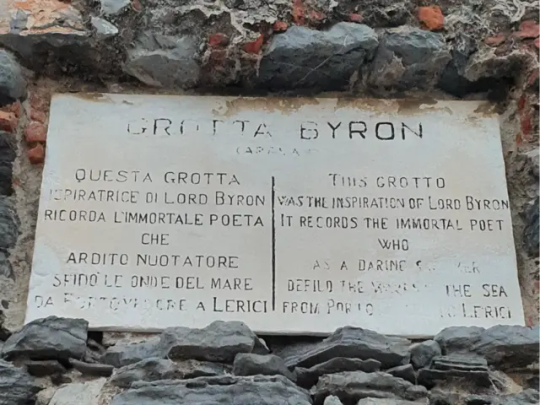
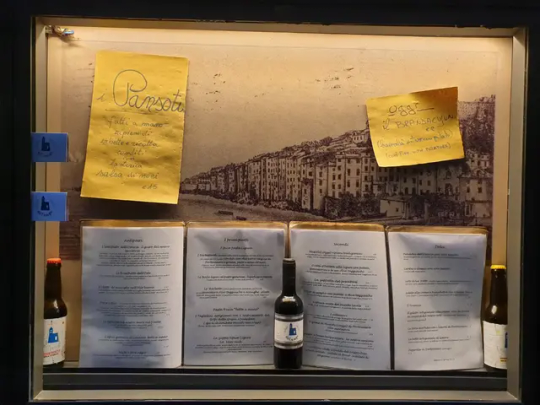

This place 44°3'19"N, 9°50'15"W has become like a super fast charger for my family. It's more than that reliable cocktail of sun & sea, fresh mussels & lemon, multi-coloured houses, pebble beaches, deep-fried anchovies and pesto. It's the time to stop. To sleep. To swim in the sea. To discuss the future. My father paints, my mother reads. We cook, we laugh, we eat out on our terrace on Via Olivo; sometimes we eat out in town. We heal.



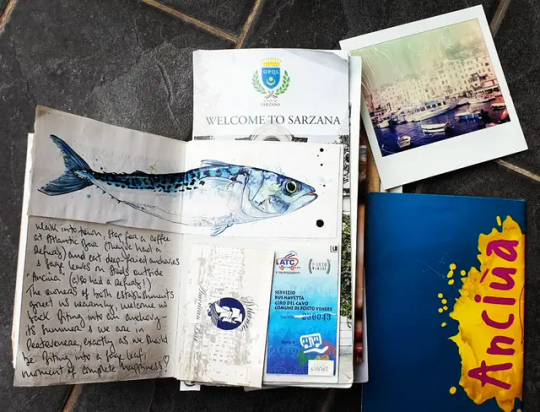
This notebook has been coming here since 2016, filled with local illustrations, our gentle exploration of this part of the world, our routines & rituals, what we eat, what we read, what we do, how we feel. It only has a few blank pages left, so this year is its last year here.
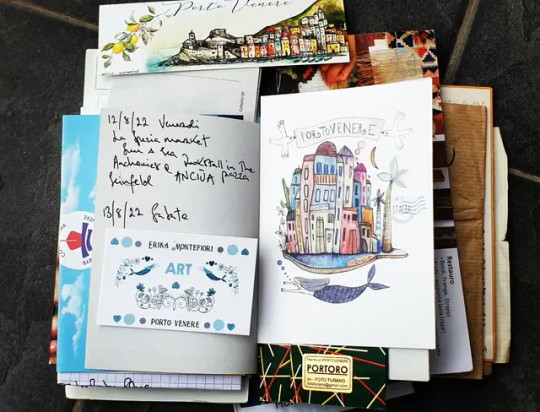


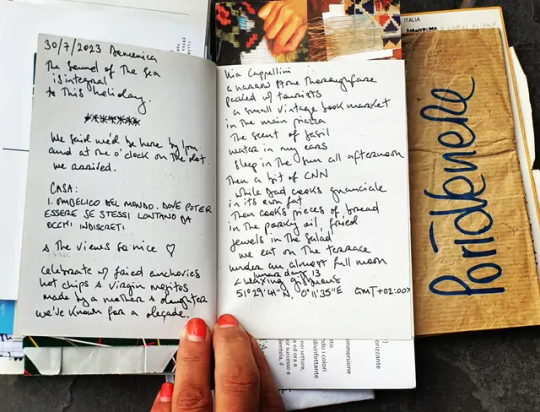
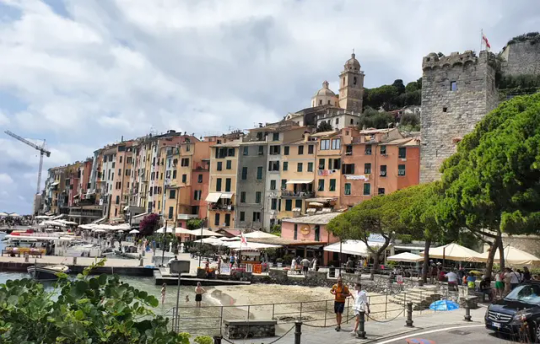
The ancient Portus Veneris is believed to date back to at least the middle of the 1st century BC. It has been said that the name refers to a temple to the goddess Venus which was sited on the promontory where the church of San Pietro now stands.
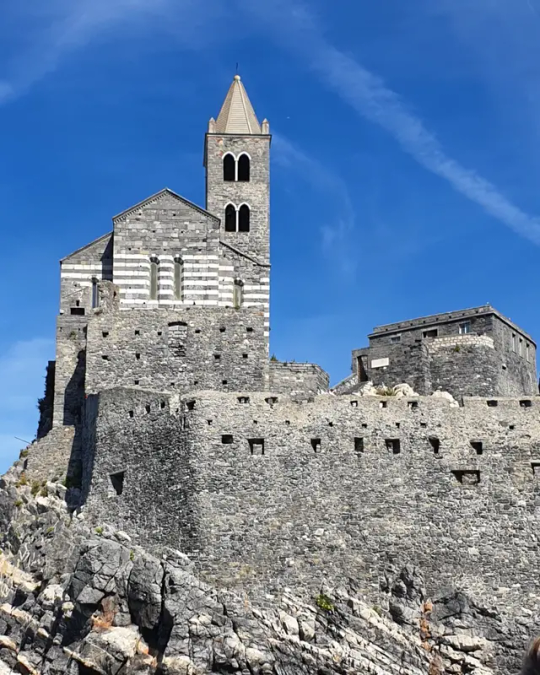
In Roman times the city was essentially a fishing community.

Via Cappellini, a narrow multi-coloured thoroughfare sometimes packed with the Cinque Terre tourists, sometimes not.
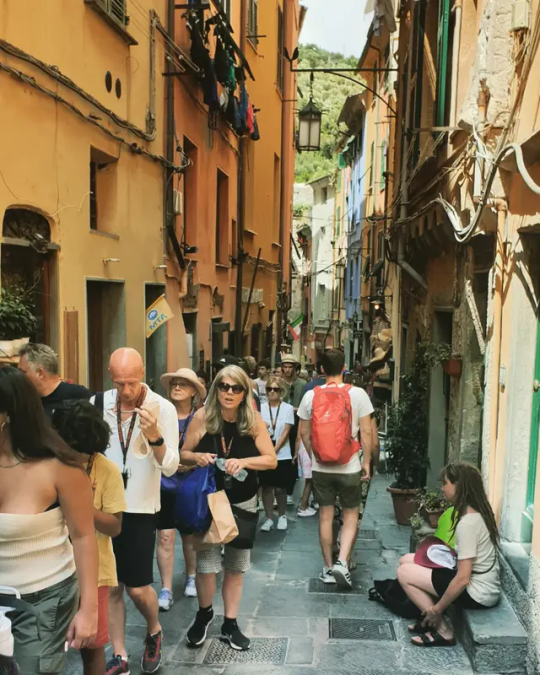
An antique vintage book market in the main square, the scent of basil, water in my ears, sleeping in the sun all afternoon then a bit of CNN news while my father cooks guanciale, adding chunks of bread which cook in the porky oil, fried jewels in the salad we eat on the terrace under an almost full Harvest moon. Waxing (very) gibbous.

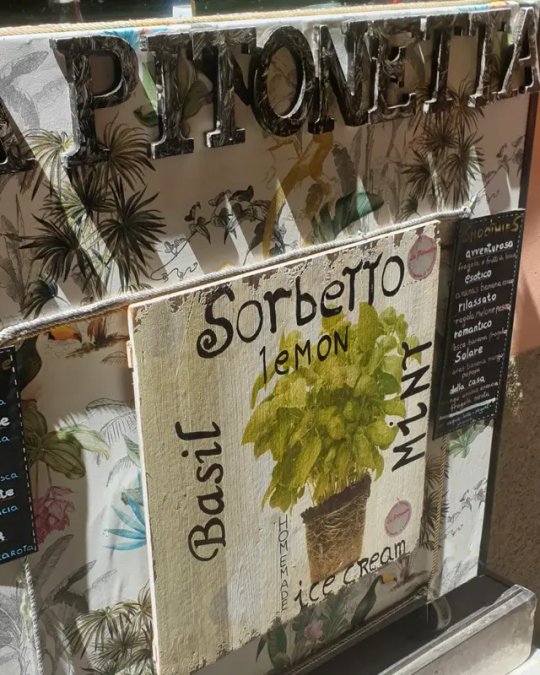
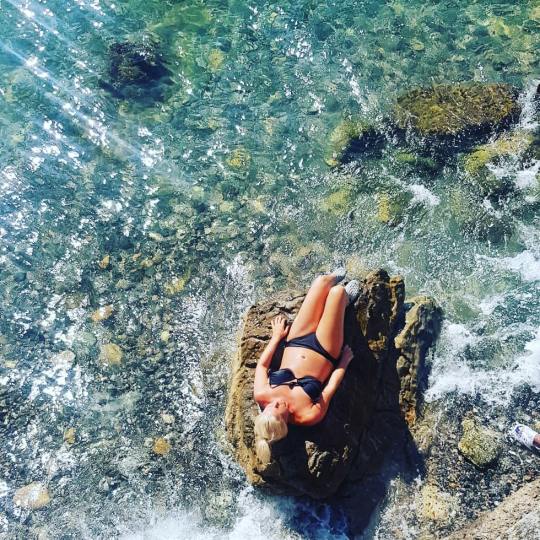
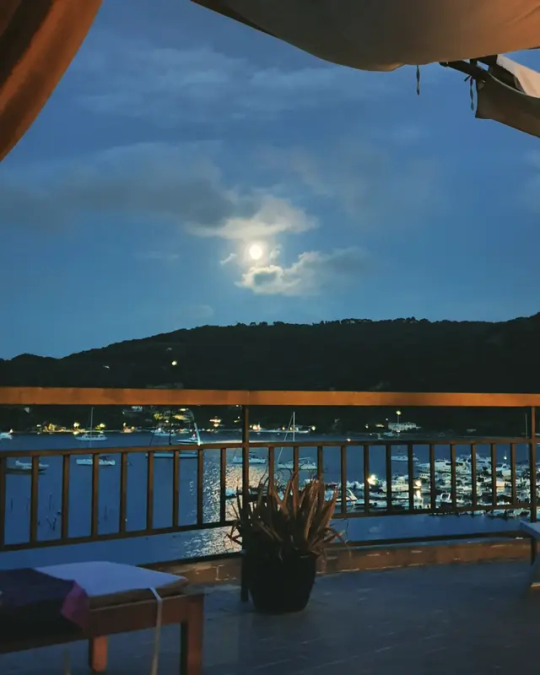
The Monday morning market in Portovenere - buying peaches & green beans, a pair of flip flops & a roast chicken from rude Riccardo.

The pebble beach in front of the American bar.
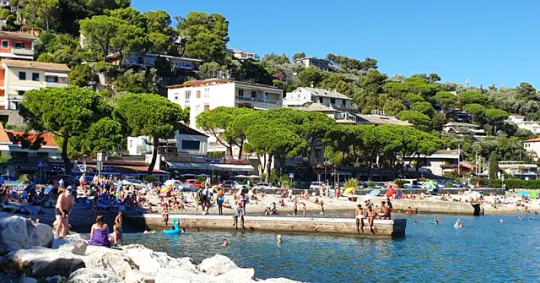


The rocks, and their mermaids.

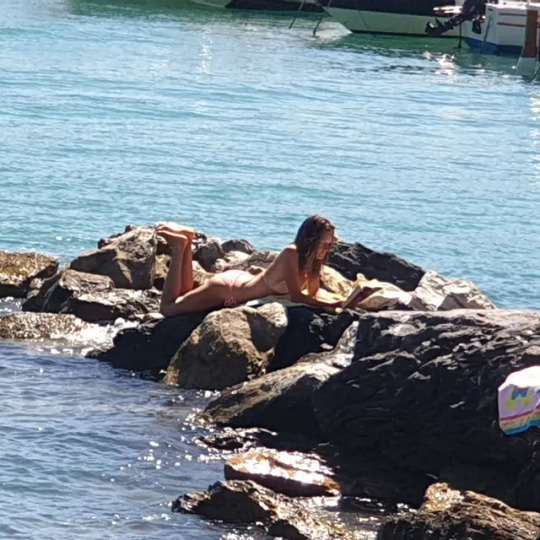
Biting into a deep-fried anchovy in Via Cappelini. It's hot and steamy, my lips are salty, the air smells faintly of shit & lemons, sweet & sharp. We are in Portovenere and I'm so happy. This basil mojito is heaven.
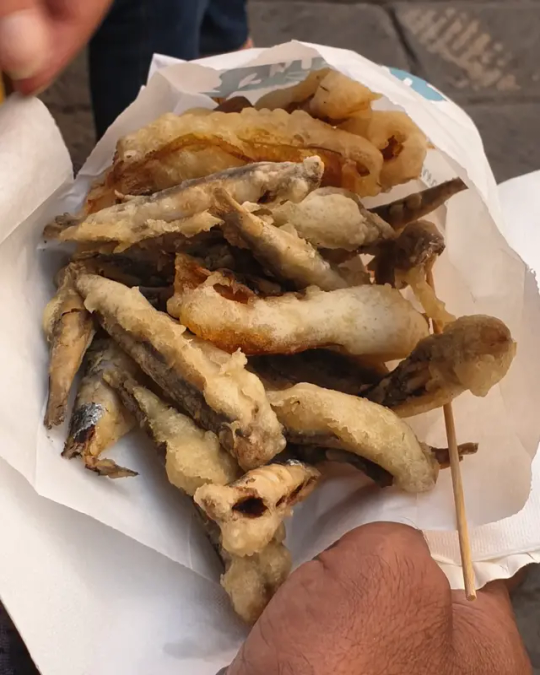

There is lots to do in Portovenere. Look it up in an Eyewitness Guide. I have done everything there is "to do" in Portovenere and I really don't go to Portovenere to do stuff. I go for my August Super Fast Charge which gets me to Boxing day when I fly to Venice for a fortnight with my family for our other Super Fast Charge of the year.
Essential Summer Super Fast Charge ingredients: sun, sea, salt, basil, anchovies, lemons, books, a camera & notebook, family love.
#portovenere#summer holiday#notesonasummer#liguria#italy#notebook#travel writing#and the views so nice#anchovies#il mare#sea#sun#salt#basil#books#beach#alessiaphotography
3 notes
·
View notes
Text
Davide Cedolin — Ligurian Pastoral (Island House)
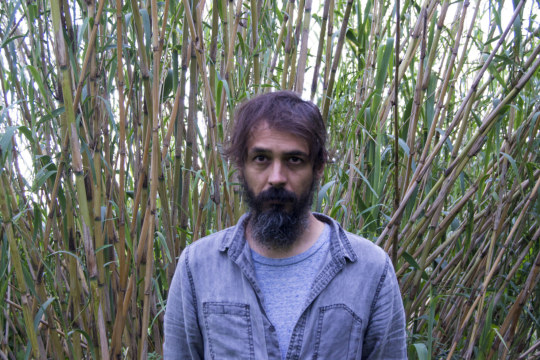
Ligurian Pastoral by Davide Cedolin
Liguria, in Italy, is where the boot might meet the top of the thigh, a mountainous region in which rocky cliffs jut out of the sea and tourists hike from fishing village to fishing village along the Cinque Terre. It’s not exactly unpopulated — the largest city is Genoa — but there are lots of parks and natural areas, and it is there in these wilder places that guitarist Davide Cedolin finds inspiration.
This cassette release collects seven serene and unruffled meditations, mostly in finger picked acoustic guitar, but augmented sometimes with threads of bowed bass, lap steel and harmonica. Natural sounds, like a thunderstorm and bird noises, move in and out of these pieces, which are, themselves, natural and unpretentious. You can imagine the guitarist working them out in some sunny spot, perhaps picking up stakes and running inside when the weather turns and its starts to rain.
“Ca de Cavo” is especially lovely, its eddying cascades of finger picking shot through with bending, shifting tones of lap steel (that’s Mike Horn from Seawind of Battery sitting in). These compositions are not overly concerned with melody or song structure. They unspool in repeated patterns with few signposts indicating beginning, middle or end. They open out into a kind of wide-horizoned dreaminess, an infinity pool of sound that stretches as far as you can see.
Cedolin’s Instagram tells us that he’s been learning from Daniel Bachman, another skilled finger-picker whose compositions stretch to incorporate the living world. He is, at least so far, more tethered to the sound of his instrument; field recordings nest in the crevices of his songs, rather than taking them over. In “Lische Alte,” for instance, the rumble of wind slips between pensive guitar chords, the arc of lap steel (Horn again) tracing a throughline in the lyric jangle.
Ligurian Pastoral exists in its own time and space. It’s in no hurry to get to the end of its placid compositions, nor, after a while, is the listener. But it does take some adjustment, some slowing, some calming, some willingness to sit with this music, to get to its pleasures. Put it on with the sun streaming in and the whole afternoon idling in front of you. It will unfold like a flower.
Jennifer Kelly
#davide cedolin#ligurian pastoral#island house#jennifer kelly#albumreview#dusted magazine#finger-picking#guitar#field recordings#mike horn#seawind of battery#genoa#italy
3 notes
·
View notes
Text
Portofino : ep197
I feel kissing on my neck and ear lobe to gently wake me up.
Cheyenne: Baby, wake up. I think we died at sea. The boat must have sank last night.
I’m really groggy trying to wake up, but I’m not buying her story. Me: I don’t feel dead honey, come back to bed.
Cheyenne: Look out the porthole, we died and went to heaven.
Me: Shy, we’re living in sin. If we died in a shipwreck, we’d wake up in hell.
Cheyenne: There’s no way that there is any place on earth that is actually this beautiful. I’m pretty sure we’re in heaven.
Me: That’s just Portofino honey.
…
Tucked into a tiny spit of land about 10 kilometers south of Genoa along the northernmost coast of the Ligurian sea, Portofino is one of the most scenic ports in the known universe. The actual port covers land equivalent to a few football fields (or over here, football pitches) and nearly every square meter is occupied with a yacht. Three sides of the port feature high walls, like an amphitheater, and the northern wall has a picturesque waterfront with buildings in Mediterranean hues of yellow, burnt orange and gold.
Our sailing yacht is huge, so we’re anchored just outside of the harbor in about 30 feet of warm crystal blue water.
I throw on shorts and a t-shirt and tell Cheyenne to put on her bikini under her exercise gear as I dart out the door.
“I’ll be right back”
I return a minute later and get some running shoes on, gather up Cheyenne and head for the deck. By the time we emerge from our suite, Filet has pulled together a tiny breakfast picnic for us and put it into a shopping bag. I tuck breakfast into a rucksack, then we hop in the dinghy and the captain whisks us off to shore.
Cheyenne: What are we doing?
Me: We’re going to hike up to the lighthouse before everyone else wakes up.
Cheyenne: This is breathtaking. I honestly didn’t know that places this beautiful actually existed in real life. I thought it was just in screensavers and photoshop.
Me: Remember Henrik’s Ferrari? The one called the California? When they discontinued it, do you know what they replaced it with?
Cheyenne: No. What?
Me: A model called a Portofino.
Cheyenne: Gawd … can you imagine driving Henrik’s Ferrari around here?
Me: Somebody at Ferrari obviously did.
Cheyenne: Wow. Apropos!
…
The land on the little peninsula above Portofino is ultra-premium A+++ real estate, but somehow it hasn’t been overdeveloped with mega-mansions. There is a rustic trail that ascends to a ridgeline. Each cobbled stair step is two steps deep, but only about one half step up. So it creates an odd cadence. Step forward, step up, step forward, step up. So you’re always stepping up with the same foot. We pass terraced gardens of grapes and olives, and an ancient castle called Castello Brown before reaching the lighthouse.
The Faro di Portofino is a bright white lighthouse that sits proudly on the rocks at the end of the peninsula. From their terrace bar, there are nearly 360 degrees of sweeping ocean views. It’s beauty that defies description. There’s a cocktail bar that opens for tourists at 10am, but we’re here well before they open, so we commandeer a table and enjoy our breakfast picnic of yogurt parfait, fresh fruit, and orange juice.
Me: You know what baby?
Cheyenne: What?
Me: You may have been right.
Cheyenne: Told ya’ …
We died and went to heaven.
#novel#first person narrative#portofino#ferrari#italy#mediterranean#ligurian sea#fino di portofino#love#sailing
2 notes
·
View notes
Text
In Niça they have the pissaladiera, which some people call the "niçard pizza" because like pizza, it's a flatbread with a garnish of vegetable sauce, but in this case it's a sauce made up of onions cooked until they're a compote and spreadable, and on top of it you have black olives and pissala, a spread/sauce made of anchovies macerated in salt, similar to the roman garum
Historically Niça has been ping-ponging between France and several Italian states until France yoinked it definitely (for now at least) in the mid-19th century along with Savoy, so its cooking is definitely influenced by northern Italian cooking, especially Ligurian cooking
All the ingredients of the pissaladiera are native to the Mediterranean area, and "flatbread cooked with a vegetable/plant garnish and sometimes cheese and meat/fish" is actually a pretty common dish on all shores of the sea (manakish, lahmacun, catalan coca, pizza obviously... are other examples), and has been attested at least since roman times. The garnish varies a lot with time and place, but the garnished flatbread still reigns supreme
As for pasta, pesto is a common sauce to eat with pasta in Liguria, as well as many cream, egg and cheese-based sauces (like the egg and cheese-based carbonara, though it's a recent recipe too). Meat and fish are commonly seasoned with herbs and garlic-based sauces Although they became very common in the last century, there was and there is still much more to Italian cooking than just tomatoes and tomato sauce
Well I would give a medieval peasant some spaghetti.
#plus there's not one italian cooking#there are dozens of cultures in Italy and a big divide between the northern ones and the southern ones#not to forget the sicilian and sardinian cultures
79K notes
·
View notes